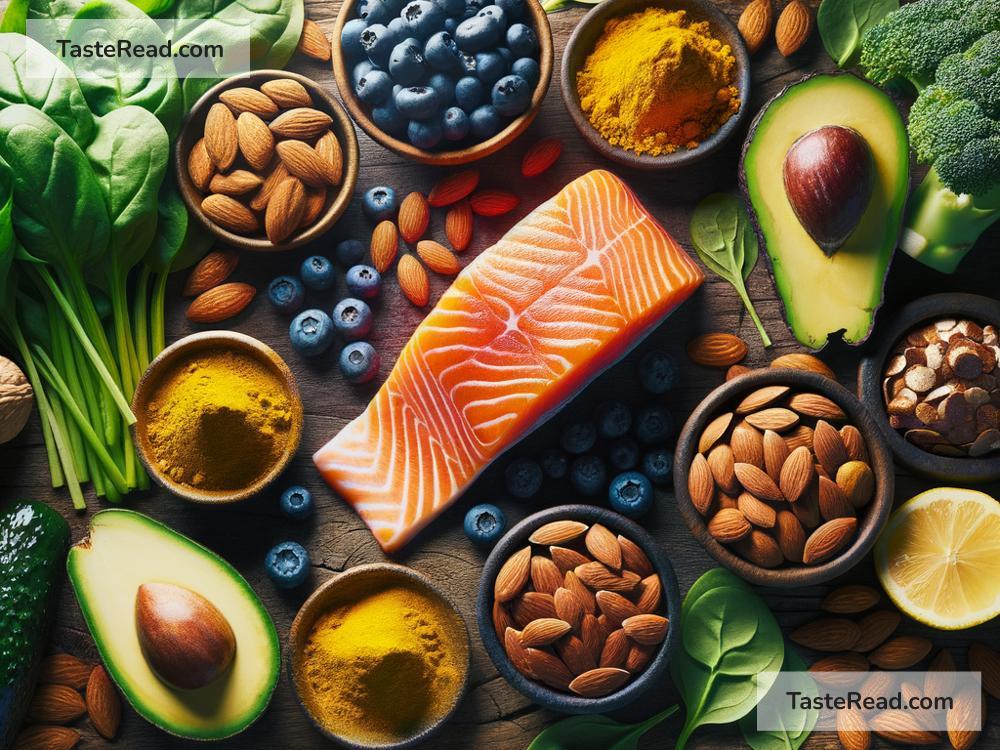Foods That Reduce the Risk of Chronic Inflammation
Inflammation is the body’s way of protecting itself from harm. When you cut yourself or catch a cold, for example, your body sends immune cells to the affected area to fight off infection or begin healing. This type of inflammation is short-term and helpful. However, chronic (long-term) inflammation is different. It happens when your body stays in a state of alert for too long, even when there’s no immediate threat. Over time, chronic inflammation can lead to serious health problems such as heart disease, diabetes, arthritis, and even some types of cancer.
The good news? Your diet plays an important role in managing chronic inflammation. By eating certain foods regularly, you can lower your risk of inflammatory diseases and improve your overall health. This article will explore some of the best anti-inflammatory foods to add to your meals.
1. Fatty Fish
Fatty fish like salmon, mackerel, sardines, and tuna are rich in omega-3 fatty acids. Omega-3s are nutrients that help fight inflammation in the body. Studies have shown that eating fatty fish can reduce markers of chronic inflammation, especially in people with heart disease or arthritis.
Try to eat fatty fish at least twice a week. Grill, bake, or sauté them for a healthy and delicious meal.
2. Leafy Greens
Spinach, kale, Swiss chard, and other leafy greens are loaded with vitamins, minerals, and antioxidants. One antioxidant found in leafy greens, called vitamin E, protects the body from damage caused by inflammation. These vegetables are also high in fiber, which helps control blood sugar and reduce inflammation.
Add leafy greens to your salads, smoothies, or soups to make your meals more nutritious.
3. Berries
Berries—such as strawberries, blueberries, raspberries, and blackberries—are tiny but powerful superfoods. They contain antioxidants called anthocyanins, which have anti-inflammatory effects. These antioxidants also help protect your cells against damage and support your immune system.
Enjoy berries as a snack, sprinkle them over oatmeal, or blend them into a refreshing smoothie!
4. Turmeric
Turmeric is a bright yellow spice often used in Indian and Middle Eastern cooking. Its active ingredient, curcumin, is known for its strong anti-inflammatory properties. Research suggests that curcumin can help reduce inflammation in conditions like arthritis, diabetes, and even certain cancers.
Don’t forget to pair turmeric with black pepper, as it helps your body absorb curcumin more effectively. You can add turmeric to soups, rice dishes, or even make a soothing turmeric tea.
5. Nuts
Nuts, especially almonds and walnuts, are packed with healthy fats, protein, and fiber. They also contain vitamin E and other compounds that fight inflammation. Walnuts, in particular, are high in omega-3 fatty acids, making them a great snack for your anti-inflammatory diet.
Grab a handful of nuts as a snack, or sprinkle them over salads and yogurt for some crunch.
6. Olive Oil
Extra virgin olive oil is a staple of the Mediterranean diet, known for its numerous health benefits. Olive oil contains a compound called oleocanthal, which acts similarly to anti-inflammatory medications. This heart-healthy fat not only reduces inflammation but also lowers the risk of heart disease.
Use olive oil for cooking, drizzle it over salads, or dip whole-grain bread in it for a tasty treat.
7. Whole Grains
Unlike refined grains (such as white bread and pastries), whole grains like oats, quinoa, and brown rice retain their fiber and nutrients. Fiber helps regulate blood sugar and promotes healthy gut bacteria, which play a role in controlling inflammation.
Replace refined carbs with whole grains in your meals to keep inflammation at bay. For example, switch your white rice with brown rice or your regular pasta with whole-grain pasta.
8. Green Tea
Green tea is known for its high levels of antioxidants, particularly epigallocatechin gallate (EGCG). This powerful compound helps reduce inflammation and lowers the risk of chronic diseases like heart disease.
Sip on green tea as a warm morning beverage or enjoy it iced in the afternoon.
9. Garlic
Garlic is not just a flavorful ingredient—it’s also a natural anti-inflammatory. Garlic contains compounds like allicin, which reduce inflammation and support immune health. It’s been linked to lower risks of heart disease and improved joint health in arthritis patients.
Add garlic to stir-fries, pasta dishes, or roasted vegetables for both taste and health benefits.
10. Tomatoes
Tomatoes are rich in vitamin C, potassium, and lycopene—an antioxidant that fights inflammation. Cooked tomatoes, such as those in soups or sauces, have even more lycopene than raw ones.
Use tomatoes in your salads, create homemade pasta sauces, or make a hearty tomato-based soup.
Final Thoughts
Chronic inflammation doesn’t happen overnight, but it can build up over time if you’re not careful about your lifestyle, especially your diet. By regularly eating anti-inflammatory foods like fatty fish, leafy greens, and berries, you can help protect your body against long-term health problems.
Remember, your diet is just one piece of the puzzle. Staying physically active, managing stress, and getting enough sleep are also important for reducing inflammation. Make these healthy choices a part of your routine, and your body will thank you!


